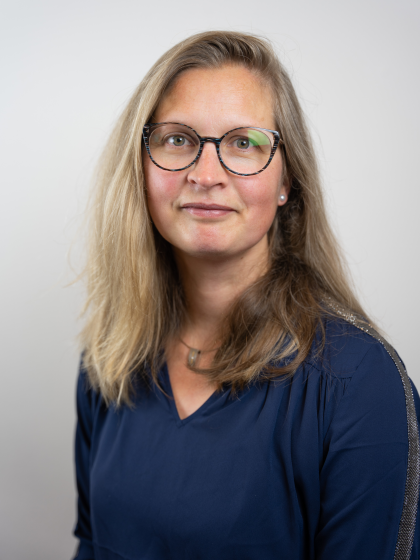dr. M.L. (Marline Lisette) Wilders

PhD projects (Co-supervised)
Rimvyde Muzikeviciute. The Arts as a Catalyst in Shaping Local Sustainable Food Cultures. University College Fryslân, University of Groningen. Promotor: Prof. dr. G. de Jong (PhD begun 2022).
Lambert Rozema. Sensing the walls of Mouraria. Faculty of Spatial Sciences, University of Groningen. Promotores: dr. B. van Hoven (PhD begun 2020).
Antine Zijlstra. Phd-dissertation: ‘Ernstig geluk, naar een model voor de analyse van waardenhiërarchieën in theatergebruik’, 2019. Faculty of Arts, University of Groningen. Promotor: Prof. em. J.J. van Maanen. Defended: July 9, 2020
2024-2027
ACT UP! Active Citizenship through Theatre for Urban Politics
Wilders is co-PI of the Erasmus+ KA220-HED (Cooperation partnership in Higher Education) funded by the European Union.
Project partners: University of Groningen (coordinator), University of Tartu, Oslo Metropolitan University, University of Cape Town.
The project aims to promote civic engagement and participation in response to the climate emergency and associated social impacts, thereby critically exploring how citizenship can be 'performed' in new ways focusing specifically on urban space as a site for democratic expression and negotiation of common values. In doing so it contributes to fostering a sense of common values and common humanity while negotiating the many different perspectives, values, interests and tensions that condition the fight against climate change in urban arenas. ACT UP! uses innovative theatre-based educational methods within a transdisciplinary context and develops and implements the ACT UP! methodology, in the cities of Groningen, Viljandi, Narva, Oslo and Cape Town. Urban spaces in these cities provide key learning arenas, moving educational approaches from the academy into the streets, developing capacity for navigating urban climate politics ‘on the ground'.
2020-2022
Proeftuin Nieuw Publiek was a long-term project commissioned by the three Northern provinces into the relationship between cultural offerings and people's living environment. Ten cultural institutions in Friesland, Groningen and Drenthe participated in this research. The research looked at innovation of the perspective on the problem of audience outreach, and investigated contours of cultural democracy in the region. The project was financed by We the North, Performing Arts Fund NL (Fonds Podiumkunsten) en VSBfonds. The research was done by researchers from ICOG, theme group Arts and Institutional Change. Wilders was appointed researcher on the project.
2015-2018
CHIME : Cultural Heritage and Improvised Music in European Festivals
Wilders was a post-doctoral researcher within the Dutch team of CHIME. The project was funded under the JPI Cultural Heritage program by the European Community.
Project partners: Birmingham City University, University of Amsterdam, University of East Anglia, University of Gothenburg, University of Groningen, University of Sheffield.
CHIME explored the uses and re-uses of different types of heritage through the study of jazz and improvised music festivals, and examined how changing relationships between music, festivals and cultural heritage sites renegotiate established understandings and uses of heritage. The core focus on festivals reflects the important – if undervalued – position that festivals occupy in Europe’s cultural ecology, with their dynamic and synergetic relationship to spaces and cultural sites. We used jazz and improvised music as a lens through which to explore key issues in heritage research, drawing on the music’s unique and complex relationship to concepts of high and low culture, tradition, innovation, authenticity and (non)-European identity.
Wilders was a Member of the Conference committee for the CHIME conference Music, Festivals, Heritage. Siena Jazz Archive, Italy. 25-28 May 2017.
2014-2016
From working space to theatre space; the user perspective
Wilders received a personal grant from the NWO financed Rubicon programme to execute this project as a visiting post-doctoral researcher at the Interuniversitary Department of Regional and Urban Studies and Planning of the Polytechnic University of Turin between 2014-2016.
Project partners: University of Amsterdam, Polytechnic University of Turin, Balletto Teatro di Torino, Teatro Stabile di Torino.
Goal of the project was to look into the effects of adaptive reuse of industrial heritage sites for the functioning of both the performing arts and built industrial heritage in society. The project considered in what ways the conversion of abandoned industrial sites into permanent theater spaces can re-signify the various values and meanings connected to these sites. It did so by investigating how the conversion process affects the perception of industrial heritage sites and conversely, how industrial heritage sites impact the theatre experience. Empirical data on the relationship between this particular form of theatre architecture (found space at industrial sites) and theatre experience were gathered by means of audience and reception research. Additionally, the project investigated how insights into this relationship could best be implemented by the architectural field to develop successful design strategies by means of ‘research by design’. The results on this last aspect were presented in the book [RE]FRAME.
